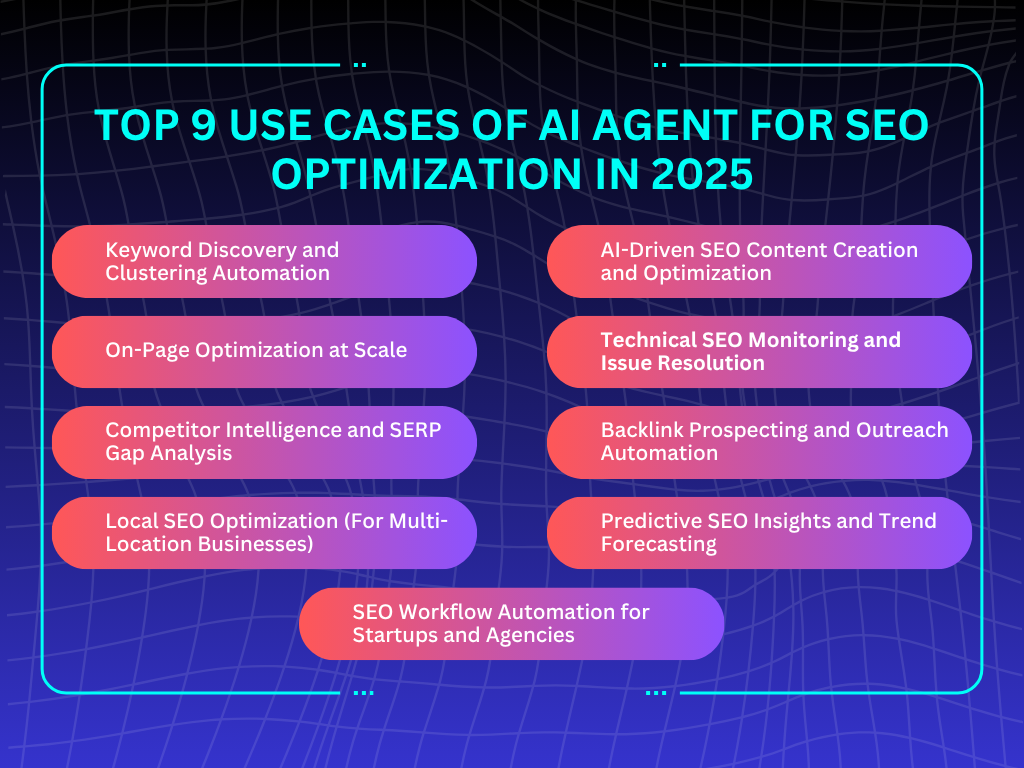
Top 9 Use Cases of AI Agent for SEO Optimization (2025 Guide)

Ever stayed awake at night, staring at your traffic dashboard, wondering why all that content effort hasn’t moved the needle? You spent hours writing, SEO tweaking, and building links. But the rankings stayed flat. That frustration is real.
Now picture having a digital partner, an AI agent for SEO, that works quietly behind the scenes. It spots weaknesses, pushes content, fixes technical issues, and nudges your pages upward while you sleep.
Sounds almost magical, right? But in 2025, this is possible.
This guide walks you through how these AI agents are rewriting the rules of SEO. You’ll learn what they are, why they matter now, and 9 powerful use cases you can put into action. If you’ve ever wondered whether AI is just hype or a real tool you can use. So, read on.
What Is an AI Agent for SEO Optimization?
Think of an AI agent for SEO as an autonomous system with a mission: it perceives data, decides actions, and carries them out, all with minimal human intervention.
Traditional SEO tools give you dashboards, reports, alerts. They help, but they stop at suggestions. An AI agent does more: it loops through data, takes actions, learns from outcomes, and repeats. It senses when rankings drop, launches adjustments, tracks impact, and improves itself over time.
A simple contrast: using ChatGPT or Jasper to draft SEO content is helpful, but those tools wait for your prompt. An AI SEO agent for startups might watch your site constantly, detect content gaps, generate pages, and optimize them without needing you to tell it every time.
The real magic is continuous optimization. These agents for workflow automation pull from multiple data sources like Google Search Console, analytics, SERP trackers, backlink tools and make decisions based on that.
They don’t just react once — they enter a feedback loop.
(Input → Analyze → Act → Feedback)
For startups, that means less manual work, faster experiments, and smarter scaling of SEO strategy. And for bigger sites, it means handling complexity at speed.
Key Capabilities of AI Agents for SEO
AI agents for SEO bring a powerful suite of capabilities that are transforming how search engine optimization is approached in 2025. At the core, these agents excel at automated keyword research, rapidly analyzing massive volumes of search data to uncover relevant keywords, long-tail opportunities, and semantic variations that might otherwise go unnoticed. This enables SEO strategies to be more data-driven and responsive to evolving search trends.
Beyond keyword research, AI agents leverage advanced natural language processing to drive effective content optimization. They can assess and enhance content structure, refine meta tags, and ensure every page is crafted as SEO-friendly content that aligns with both search engine algorithms and user expectations. This results in optimized content that not only ranks but also resonates with target audiences.
Technical SEO is another area where AI agents shine. Through comprehensive technical SEO audits, they can detect and flag issues such as broken links, crawl errors, and slow-loading pages, providing actionable insights to improve site health and search engine rankings. Their ability to conduct in-depth SERP analysis means they can evaluate search engine results pages, identify top ranking pages, and suggest precise strategies to climb higher in search rankings.
Additionally, AI agents are invaluable for competitor analysis. By dissecting competitors’ strategies, identifying content gaps, and analyzing what’s driving their search engine results, these agents empower SEO professionals to make informed decisions and outperform rivals. With these capabilities, AI agents for SEO not only streamline complex SEO tasks but also drive measurable improvements in SEO performance, organic traffic, and overall search engine visibility.
Why 2025 Is the Breakout Year for AI SEO Agents
You might wonder: why now? Why is 2025 the moment when AI agent for SEO ideas are moving from lab to impact?
For one, search itself is shifting. Google’s AI-First Indexing and Search Generative Experience push sites to be more dynamic, semantically rich, and responsive to context. You can’t treat SEO as static anymore.
Second, data volumes have exploded. Every page, click, query, backlink, and user session can be sifted through if human teams can’t keep up. That pressure forces automation.
Third, AI tooling has matured. Agentic frameworks like LangChain, AutoGPT, CrewAI give you building blocks. You don’t have to reinvent every part. You can piece together data connectors, logic, and action modules.
And finally, budgets are tight. Organizations want scale without blowing their headcount. An AI agent for SEO content creation or AI agent for local SEO can do work that costs 2–3 hires in 2022.
As a data point: many SEO teams report that automated tools now handle 30–50% of their audit, content suggestions, or monitoring tasks. That’s a huge shift.
AI Agent Tools and Features for SEO Optimization
The landscape of AI agent tools and features for SEO optimization is more robust and sophisticated than ever. Leading AI-powered SEO platforms like Wordlift and SEO.ai offer end-to-end solutions that automate everything from keyword research to technical SEO audits, making them essential for SEO professionals aiming to stay ahead in a competitive digital landscape.
Integration with Google Search Console and Google Analytics is a hallmark of these platforms, allowing AI agents to tap into real-time search traffic and performance data. This connectivity ensures that every SEO strategy is grounded in actionable insights drawn directly from search console and analytics data.
Automated keyword research tools within these platforms help uncover new keyword opportunities and track keyword rankings with just a few clicks, while content optimization features use natural language processing to generate SEO-friendly content that matches both search intent and user intent.
Technical SEO is made easier with built-in tools for internal linking suggestions, meta tag optimization, and automated detection and fixing of broken links. These features streamline technical SEO tasks, ensuring that websites remain healthy and optimized for better search engine rankings. Competitor analysis tools provide a window into competitors’ strategies, revealing content gaps and opportunities to refine your own SEO efforts.
Finally, rank tracking capabilities allow for continuous monitoring of keyword rankings and search engine performance, enabling SEO teams to quickly adapt their strategies for maximum impact. By leveraging these advanced AI SEO tools, digital marketers and SEO specialists can optimize content, automate repetitive SEO tasks, and achieve superior results in search engine results pages—ultimately driving more organic traffic and elevating their SEO game.
Top 9 Use Cases of AI Agent for SEO Optimization in 2025
Here are nine practical, high-impact ways an AI agent for SEO can serve your site in 2025:

1. Keyword Discovery and Clustering Automation
An agent can crawl SERP patterns, competitor content, and your own site to build keyword clusters without spreadsheets. It groups seeds with long-tail variants, tags by intent (informational, transactional), and prioritizes by opportunity. The best enterprise AI agent for SEO will refresh clusters weekly and alert when new keywords emerge.
2. AI-Driven SEO Content Creation and Optimization
Instead of asking a writing tool to produce a draft, an SEO agent can generate full outlines, paragraphs, meta tags, and internal links. Then monitor performance and refine. When traffic shifts, it updates content. That’s what an AI agent for SEO content creation does: it doesn’t just write, it evolves the content.
3. On-Page Optimization at Scale
Imagine hundreds or thousands of pages. An AI agent audits titles, headings, schema, alt tags, URL structure, internal links — then either recommends changes or even deploys fixes. It can detect low-CTR pages and push variants automatically.
4. Technical SEO Monitoring and Issue Resolution
Crawls never stop. An AI agent tracks broken links, server errors, slow pages, canonical issues, mobile usability errors. When minor issues arise (e.g. missing meta tag), it triggers alerts or uses API to fix them. This way, you don’t wait weeks to catch problems.
5. Competitor Intelligence and SERP Gap Analysis
The agent scans competitor sites, tracks their content updates, backlink moves, and SERP volatility. It finds gaps in topics they cover that you don’t. It proposes content to fill those gaps. It gives you intel you’d normally spend hours digging for.
6. Backlink Prospecting and Outreach Automation
Using NLP and domain analysis, the agent hunts for relevant backlink opportunities. Then it crafts outreach emails personalized to topic, context, or page. It automates follow-ups. You still validate, but the heavy lifting is done.
7. Local SEO Optimization (For Multi-Location Businesses)
An agent syncs with Google Business Profiles, citations, review platforms. It monitors consistency, suggests local keyword variants, and even drafts review replies. That kind of AI agent for local SEO keeps each location healthy in its region.
8. Predictive SEO Insights and Trend Forecasting
By analyzing past ranking shifts, seasonality, query growth, the agent forecasts which keywords may spike next. It triggers content creation before competitors. It spots that a topic is about to rise. You get ahead.
9. SEO Workflow Automation for Startups and Agencies
For small teams, repetitive tasks are drainers: reporting, audits, keyword tracking, dashboards. An agent can automate that so your team focuses on strategy and creative work. That is the role of an AI SEO agent for startups, helping lean teams scale.
How to Build Your Own AI Agent for SEO
So you want to build an AI agent with no coding required? Here’s a blueprint with layers and tools to help you get started.
Tech Stack Ideas
- Core frameworks: LangChain, CrewAI, AutoGPT — they let you chain tasks, manage memory, orchestrate agents
- APIs / Data connectors: Google Search Console API, Analytics API, Ahrefs / SEMrush API, site crawler APIs
- LLM engine: OpenAI, Claude, or other large LMs as decision/analysis brains
Steps to Build
- Define your goal: Maybe content optimization, audit automation, or proactive content creation
- Connect data sources: Feed the agent live info from GSC, traffic, crawling tools
- Train on brand voice & SEO rules: Inject your style, style guide, SEO constraints
- Develop action modules: Code logic modules like “audit fixer,” “content updater,” “link outreach”
- Set up feedback loop: Agent must monitor result (rankings, traffic), learn, and refine next actions
It’s best to start a hybrid, human and agent. Over time, the agent can handle more.
Real-World Examples / Case Studies
Startup Case: Growth via Autonomous SEO
A small e-commerce startup hooked up an AI agent for SEO content creation to their blog and product pages. Within three months, organic traffic rose by 45%. Click-through rates improved, and the agent’s content updates locked in stronger rankings for dozens of long-tail keywords.
Enterprise Use: Scaling Audits
A large enterprise with 10,000+ pages deployed an agent that audits and pushes fixes automatically. They saw 10× faster audits, fewer site errors, and a consistent snippet of pages climbing on page 1.
These real outcomes show that AI agents are not just experiments as they’re working tools now.
Key Benefits and ROI of Using AI Agents for SEO
- 10× faster audits across all pages
- Up to 50% reduction in time spent on content tasks
- Continuous optimization as pages evolve without manual updates
- Cost savings for teams as agent covers many tasks a full team used to do
- Better consistency across your site
- Ability to scale rapidly without multiplicative human cost
- Smarter insights, fewer surprises
Put simply: the best AI agent for SEO optimization gives returns in hours, not months.
Challenges, Limitations & Ethical Considerations
AI agents are powerful, yes, but not perfect.
- Over-automation can lead to stale, repetitive content
- AI can hallucinate; incorrect facts or references
- Agents may over-optimize (keyword stuffing) if unchecked
- Voice and authenticity suffer if no human edit
- Must maintain compliance with Google’s E-E-A-T and avoid manipulative tactics
The safeguard is always human oversight, validation, and quality review.
Future of AI SEO Agents (2025–2030 Outlook)
- Multi-agent systems handling full SEO pipelines: one agent for content, another for backlinks, etc.
- Generative Search Optimization (G-SEO): agents optimizing for AI-powered search engines
- Integration with CRMs, CMS, analytics suites: agents work across systems
- Prediction: by 2030, most SEO operations in agencies will be conducted via autonomous agents
The future is that SEO becomes not hourly tasks but strategy and supervision.
Conclusion
The age of SEO is shifting. No longer is it just about analysis and manual updates. With AI agents for SEO technology maturing in 2025, the ability to scale, respond quickly, and maintain quality is now real.
Ampcome helps companies build and deploy these very agents — from ideation to execution — so SEO becomes a growth engine, not a burden. If your team wants to get ahead in this next chapter of search, reach out to Ampcome and let them help you turn SEO into an autopilot advantage.
FAQs
1. What exactly is an AI agent for SEO optimization?
Think of it as a smart assistant that can analyze your website, figure out what’s working and what’s not, and take actions to improve your rankings. Unlike basic SEO tools, it can act on data, learn from results, and keep optimizing automatically over time.
2. How is an AI agent different from regular SEO tools like ChatGPT or Jasper?
You might be used to tools that generate content or analyze keywords. AI agents go a step further. They operate almost like a mini SEO team to monitor your site, optimize pages, analyze competitors, and even predict trends.
3. Can AI agents handle local SEO for my business?
Absolutely. The right AI agent can sync your Google Business Profiles, manage reviews, suggest local keywords, and even help with citations. It’s like having a local SEO expert constantly looking after your rankings while you focus on running your business.
4. Will using an AI agent replace my SEO team?
Not completely. AI agents are amazing at handling repetitive, data-heavy tasks, spotting trends, and running tests fast. But human insight is still crucial for strategy, creativity, and quality control. Think of it as a teammate who speeds up your SEO work and frees up your time.
5. Can startups really benefit from AI SEO agents?
Yes, and a lot. For startups with small teams, these agents can automate reporting, audits, and content recommendations. This lets you compete with bigger players without hiring a huge team and helps you grow your organic traffic efficiently.

Transform Your Business With Agentic Automation
Agentic automation is the rising star posied to overtake RPA and bring about a new wave of intelligent automation. Explore the core concepts of agentic automation, how it works, real-life examples and strategies for a successful implementation in this ebook.
More insights
Discover the latest trends, best practices, and expert opinions that can reshape your perspective
Contact us












